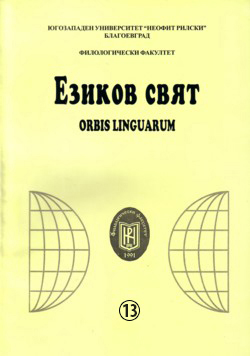FROM THE LOST LIBRARIES TO ARTIFICIAL INTELLIGENCE
FROM THE LOST LIBRARIES TO ARTIFICIAL INTELLIGENCE
Author(s): Ellie BoyadzhievaSubject(s): Language and Literature Studies, Theoretical Linguistics, Historical Linguistics, Philology
Published by: ЮГОЗАПАДЕН УНИВЕРСИТЕТ »НЕОФИТ РИЛСКИ«
Keywords: philology; interdisciplinary and holistic approaches; storing and retrieving knowledge; antiquity and modernity.
Summary/Abstract: The paper looks into the development of philology as a science from Antiquity to Modernity analyzing the factors influencing every stage in its development. It focuses on the typological features characterizing every stage. Special attention is paid to the causes leading to the fragmentation of philology into different fields and branches and the typological features that unite them under what is understood as classical philology. Philology has thus become an umbrella term sheltering seemingly unrelated disciplines nowadays. The assumption that there are two basic institutions, namely, libraries and schools in its broad meaning, through which knowledge has been stored and handed down on next coming generations, is discussed extensively. It is also proposed that in the period of postmodernism philological endeavors have taken a U-turn toward the classical holistic approach of Antiquity that underlie new concepts in literature and linguistics such as intertextuality, corpus analysis and artificial intelligence thus forming a spiral in its historical development. Finally a conclusion is reached that philology has not changed drastically in its general ideology having always been interdisciplinary by nature. The reason is the fact that language being in the core of any philological investigation is a pure human phenomenon and is itself holistic in nature.
Journal: Езиков свят - Orbis Linguarum
- Issue Year: 2015
- Issue No: 2
- Page Range: 16-26
- Page Count: 11
- Language: English

